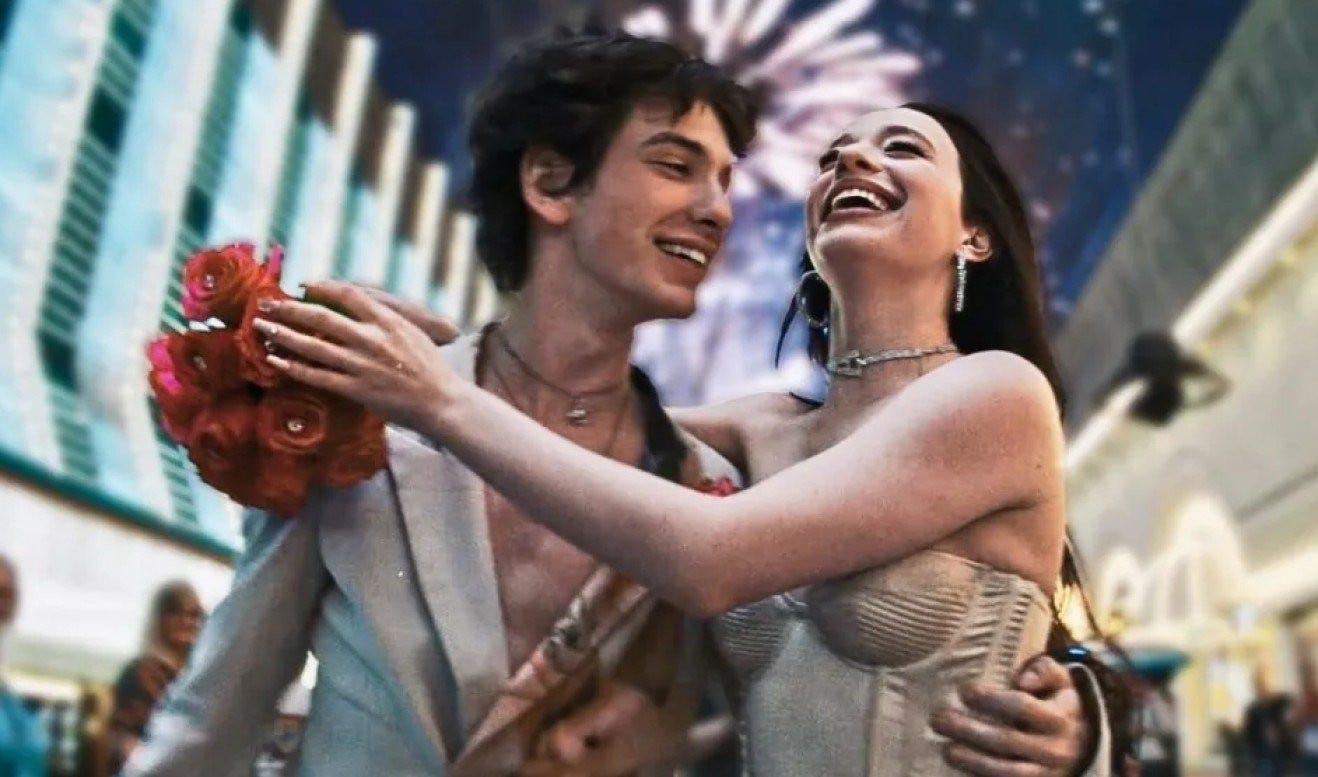Anora: Princess of Hellmerica
Lessons on crafting gritty fairytales that resonate
Happy Monday, friends!
We’ve got a special treat today: JELLYDRAGON 🔥🐲 is dropping in to grace us with our first guest post! They’re dissecting the good and the bad from the poignant cultural-moment film that is 2024’s Anora. (They write about a ton of interesting topics across pop culture over on their Substack, so you should totally check them out!) As you’ll see from this review, storytelling that resonates can still make a film magical despite any other shortcomings. So let’s dive into the hot takes on American culture that make Anora resonate with us so deeply.
Cheers,
Ceylan Gunduz (OBA Media Newsletter Editor-in-Chief)
P.S. Scroll all the way down for your sneak peek at the first episode of “Let’s Talk Stories: After Hours” with Jared Moses!
The team at OBA Media is here to help you craft honest, brave stories that resonate. We want to hear about your story and help you gain the confidence to tell it well.
Anora: Princess of Hellmerica

Gutter Glamour
Anora, released in 2024, is a modern fairytale that's nothing but raw, gritty, & honest in its portrayal of working-class struggles, echoing the narrative beats we’ve come to expect: a hopeful protagonist with big ambitions, a seemingly attainable path to success, and the promise of a better life…a softer life.
But as the story unfolds over the film's two-hour run-time, it becomes clear that Anora is not a story about triumph. Instead, it is a searing critique of the American Dream, exposing the illusions of upward mobility and the devastating bitterness of a fairytale forced to confront the cruelty & brutality of REAL life.
At its core, I'd say that this film is about a deep & primal longing very similar to the story of Griffith of Berserk fame, which is wild. The titular character, Anora, is a young woman from a working-class background. She dreams of transcending her circumstances and, even though she doesn't outright declare this, she takes any and all opportunities to level up economically.
Her aspirations aren’t lofty or selfish—they are modest and deeply relatable: a stable home, decreased stress, the chance to make something more of herself beyond the shiesty environment of the strip club, and a sense of belonging in a world that seems designed to shut her out from truly experiencing the best that life has to offer.
Yet, the film dismantles the notion that hard work and determination are enough to achieve these goals almost immediately. Vanya, the immature 21-year-old son of a wealthy Russian oligarch, lives out his life as if it's a sitcom. To Vanya, everything is a joke and everything is funny.

He enjoys toying with people for his enjoyment and he's a dream-selling extraordinaire in all the worst ways. Vanya throughout the film knows full well that Anora is financially deficient, and yet goes out of his way to show her the finest things in life such as clothes, jewelry, mansions, money, & travel…all the while knowing that Anora can never be implanted into his world or experience life on his level.
Vanya is very much like a drug dealer giving a downtrodden customer just a little taste of crack, but never an entire brick of it or the knowledge of how to make a business from the drug themselves, which would either fully satisfy them or (although dark) give them a way to lift themselves out of the mud.
The American Mirage
The myth of the American Dream has always been rooted in the idea that anyone — regardless of background — can achieve success through perseverance and off the strength of merit. But what this movie reveals is that this promise is purely smoke & mirrors…a total mirage, a glittering ideal that is liable to evaporate the closer one gets to it. As Anora climbs the social ladder and assumes the role of a class interloper, the rungs become increasingly unstable.
Opportunities are snatched away by systemic inequities, and her achievements are overshadowed by the unrelenting stigmata that comes with her occupation as a stripper & sex worker.
The film's aesthetic even mirrors this descent. Early scenes are bathed in warm, golden hues, evoking the comfort of childhood dreams and the hope that's so often imbued in the fantasy of many classic Disney fairytales. But as Anora’s reality becomes harsher, the visuals grow colder, more chaotic, & more desaturated, emphasizing the chasm between her aspirations and the unforgiving world she inhabits.
Futility & Fantasy
The magical transformation—an archetypal moment of empowerment in traditional fairy tales—proves to be superficial, offering no lasting change to Anora’s circumstances. Even the "happily ever after" of becoming free from Vanya, experiencing sexual intimacy with Igor, and finally getting to have an emotional release after suppressing her feelings for so long is revealed to be a cruel illusion.
Anora and the henchman Igor are both class interlopers who are essentially window shoppers to the jeweled life. Sure, they might've experienced certain perks, but they'll never be members of the moneyed up-country club. Igor and Anora will always be rejects of society, used for fun and utility, having no other value beyond what they're able to provide the rich elites that exist on cloud 9 high above everyone else.
One of the most striking aspects of the film is how it juxtaposes fairytale tropes with stark realism. Vanya, originally made to represent Prince Charming, gradually morphs into a symbol of fleeting stability, more interested in maintaining his own fragile position & privilege than he is about protecting Anora or standing on business when it comes to the decision he made to elope in the first place.
The film’s ending is both abrupt and haunting. After one whirlwind adventure and a wild goose chase full of many twists and turns, Anora finds herself right back where she started…but with a new understanding of the system. Turns out, she was conned & the metaphorical lottery ticket worth millions that she was offered is suddenly and coldly retracted.
This cyclical structure serves as a powerful metaphor for the false promise of upward mobility. For many, the pursuit of the American Dream is not a straight path to success but a treadmill, exhausting and ultimately futile.
What makes Anora particularly poignant is its refusal to offer easy answers or any comforting resolutions. The film does not suggest that Anora’s failure is due to personal shortcomings. Instead, it places the blame squarely on the systemic forces that perpetuate inequality and stifle progress. It challenges the audience to question the narratives we’ve been told about success and to confront the uncomfortable truth that the American Dream, as it is often portrayed, is an unattainable ideal for most — something that was created in order to strengthen America's brand & forge a grandiose mythology.

Ultimately, Anora is a fairytale for the disenchanted. It's Pretty Woman in reverse: a story that strips away the fantasy to reveal decay, depravity, and maggots festering beneath the surface. It forces us to reckon with the bitterness of dreams deferred or flat-out denied, and the deep injustices of a system that prioritizes profit and status over people. In doing so, it transforms from a simple narrative into a powerful critique of the myths we build our lives around, the delusions we cultivate…and a sobering reminder of the cost of believing in them.
A Mixed Bag & A Mixed Reception
Anora was one of the most highly anticipated films to release in 2024. When it did release, the film quickly became categorized as the spiritual successor to 2019’s Uncut Gems and the magnum opus of director Sean Baker in the eyes of many longtime admirers of his work.
For those who appreciate challenging and experimental cinema, the film is definitely a masterpiece that invites deep reflection. However, its abstract storytelling and jarring pacing can make it an alienating experience at times.
Furthermore, the film could’ve made much better decisions when it came to score. During my first viewing of the movie, I kept wondering why the music choices were so lackluster when everything else in the film in terms of plot, themes, subtext, and characters were stellar.
I believe that music can either subtract from a film or add to it immensely. In a perfect world, Anora’s story would've been enhanced by including songs such as Tommy Richman's “Million Dollar Baby,” Destin Conrad’s “Mariposa” & “It’s Yours,” and Sasha Keable’s “Auction” & “Take Your Time.”
Outside of the music choices, the film also could have cut down on the sex scenes during the first half. Director Sean Baker felt that it was essential to show Anora plying her trade as a sex worker. However, many who watched the film, myself included, found that some of these scenes would have hit harder if at least some of the sex was made to be suggestive.
Moreover, more time could have been spent building up Ivan’s character and giving him a bit more depth than he had. Ivan was excellent in a way because he was so easy to hate and be agitated with. However, when I think of Ivan, I think about the TV shows Succession, Downton Abbey, & The White Lotus.
These shows give viewers the chance to see inside the world of the elite and privileged. I feel like there were so many times in these shows that audiences got to see the pros and cons of living such a silver-spooned life, as well as the psychological horrors and brutalities involved with keeping their charmed lives.
Sadly, Anora doesn't offer us the chance to see these pros and cons through Ivan’s perspective. Everything about that man is surface level and we’re never granted the access needed to peer beneath the surface.
Lessons for Storytellers
Anora, as it stands, is a testament to the power of bold & fearless artistic vision. It’s another superb example of cinematic gutter poetry that is a masterful improvement on Sean Baker’s raw and gritty style of storytelling. While it may not resonate with everyone, there are two main universal lessons in this movie that struggling artists & creatives could apply to their own lives.
Lesson number one: never wait for others to save you from difficult circumstances. Instead, build the skills, grit, strategic mind, & leverage to pull yourself out of the fire. Lesson number two: anybody is capable of anything at any time. Never put all of your life, hopes, and confidence in another person's hands, because relationships can shift and break down. Promises can be broken. Not everyone has your best interest at heart.
Anora is important to me because it’s a true depiction of the real world that we live in right now. Not all fairytales are based on reality. While there may be many times where a person experiences spells of good luck, unfortunately not everyone wins the lottery.
If a person truly wants to be reborn and elevate in this world, then they need to crawl through the mud on their hands and knees to claim their happily ever after for themselves by any means necessary. This message isn't the most wholesome or fabulous, but it’s real, unsweetened, and brutally honest. This film is all the more gorgeous for that honesty.
I rate Anora 7/10 diamonds with a dragon’s kiss of fire 💎💎💎💎💎💎💎 🔥 🐉 [ If you’re looking to build a movie night around Anora, I recommend watching it before A Streetcar Named Desire, Midnight Cowboy, Buffalo ‘66, Taxi Driver, Only God Forgives, True Romance, Summer of Sam (1999), The Place Beyond the Pines, & Pretty Woman.]
📰 If you’re looking for exclusive content, be sure to subscribe to my FREE Substack newsletter! It’s packed with a variety of pieces on Writing tips, personal stories, social commentary, Art analysis, & True Crime. Join the community and stay in the loop—consider subscribing. 🙂⬇️
“Let’s Talk Stories: After Hours” Ep. 1
Subscribers to OBA’s newsletter get early access to our podcast episodes. Today, we’re launching “Let’s Talk Stories: After Hours” with Jared Moses. These short episodes release on the off weeks for our main podcast episodes. In them, Jared answers your questions and shares his insights and advice that didn’t make it into the conversation with all of us about effective storytelling techniques from pop culture.
Listen to the full episode this conversation sprang from here:
To submit a question for Jared to answer in the next ‘After Hours,’ feel free to reply to this email or drop a comment!
CAPTAIN’S LOG
1/10/2024
Ceylan Gunduz
Networking is hard. Marketing and social media is hard, too. As a startup company with an emphasis on social impact, we realize the necessity of reaching out to others who might want to support us. But as an introvert, I am very uncomfortable starting conversations and feeling like I’m bugging people. We’re kicking our efforts into high gear this month, so I have to keep reminding myself that 1.) My words encourage and uplift others, and 2.) We won’t be able to encourage and uplift the people we want to unless they know about the existence of One Brilliant Arc Media. My insecurity says that people will get sick of me, but I’m choosing to believe that if our company can positively impact just 1 person, it will be worth the struggle of getting out of my comfort zone!









